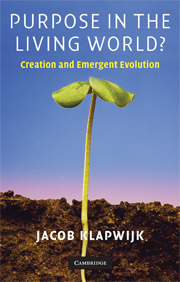Book contents
- Frontmatter
- Contents
- List of figures
- Preface
- Introduction
- 1 Does life on earth have a purpose?
- 2 Creationism, Intelligent Design, and Augustine's idea of time
- 3 Darwin, neo-Darwinism, and the naturalistic continuity claim
- 4 Miller's pre-biotic broth and the premises of evolutionism
- 5 A cold shudder along Darwin's back
- 6 The emergence theory of Morgan and Alexander
- 7 Luctor et emergo: what is emergent evolution?
- 8 Toward a general theory of emergent evolution
- 9 Hominization and the philosophy of mind
- 10 Augustinian faith and evolutionary science
- 11 The organism is a whole. The world is a habitat
- 12 The slumbering temptation of essentialism
- 13 Questions surrounding the emergence process
- 14 Enkapsis in nature. Is there an Omega point?
- Bibliography
- Index
10 - Augustinian faith and evolutionary science
Published online by Cambridge University Press: 05 June 2012
- Frontmatter
- Contents
- List of figures
- Preface
- Introduction
- 1 Does life on earth have a purpose?
- 2 Creationism, Intelligent Design, and Augustine's idea of time
- 3 Darwin, neo-Darwinism, and the naturalistic continuity claim
- 4 Miller's pre-biotic broth and the premises of evolutionism
- 5 A cold shudder along Darwin's back
- 6 The emergence theory of Morgan and Alexander
- 7 Luctor et emergo: what is emergent evolution?
- 8 Toward a general theory of emergent evolution
- 9 Hominization and the philosophy of mind
- 10 Augustinian faith and evolutionary science
- 11 The organism is a whole. The world is a habitat
- 12 The slumbering temptation of essentialism
- 13 Questions surrounding the emergence process
- 14 Enkapsis in nature. Is there an Omega point?
- Bibliography
- Index
Summary
The central question of this chapter is: how does scientific knowledge, in particular the insights of evolutionary science, relate to religious faith? Still influential in Christian circles, especially in Roman Catholicism, is the scholastic model that was developed by Thomas Aquinas. It is a model that sees reason and faith as two complementary sources of knowledge and, for this reason, strives for a synthesis between both (section 1). In this chapter I wish to plead for an alternative approach, a non-synthetic or hermeneutical model in the spirit of Augustine's adage, fides quaerit intellectum, faith seeks understanding. In this model faith functions not as an extension and completion of reason but as a source of inspiration and as a hermeneutic frame of reference for rational knowledge, also for the theory of evolution (section 2). Crisis symptoms surrounding this theory lead to the formulation of four hermeneutical ground rules (section 3). At the end of this chapter I shall attempt to bring some of my personal experiences into the discussion (section 4).
THE CREATION ACCOUNT AND THE STORY OF BECOMING
Is the theory of emergent evolution and irreducible novelties not a presentation of issues derived from Scripture, and then presented in the guise of science? I must deny this. The Bible is a document of faith: the story of God's dealing with humankind and the world. In this story one does not encounter the concept of evolution, let alone the abstract, scientific notion of emergent evolution.
- Type
- Chapter
- Information
- Purpose in the Living World?Creation and Emergent Evolution, pp. 191 - 210Publisher: Cambridge University PressPrint publication year: 2008

